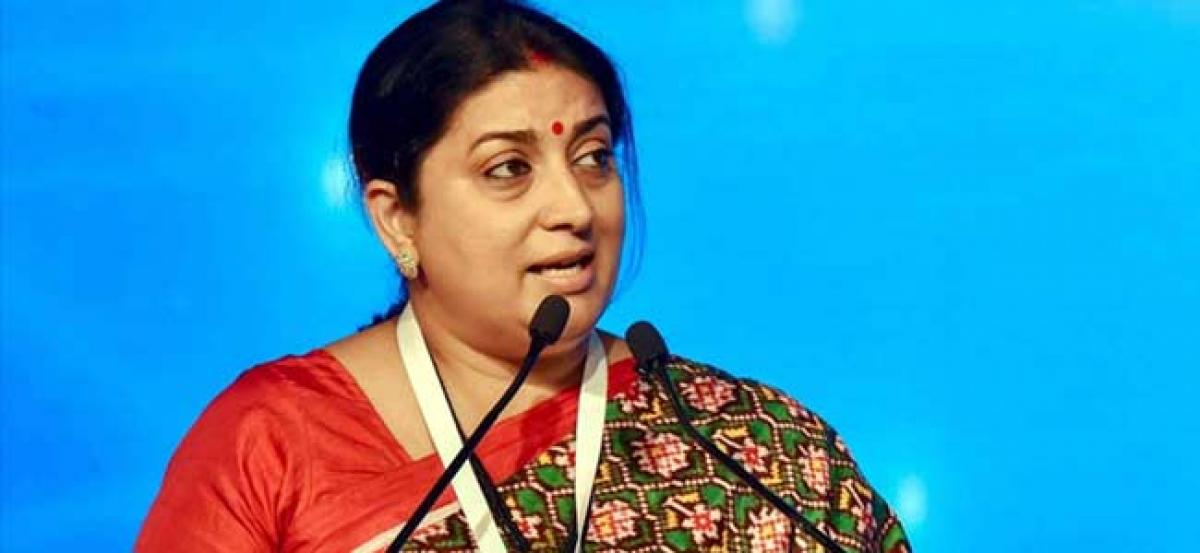Just In

India will have around 969 million Internet users by 2021, Union Minister Smriti Zubin Irani said today and pitched for putting in place \"laws, ethics and rules\" to ensure that no one player dominated the digital media industry.
India will have around 969 million Internet users by 2021, Union Minister Smriti Zubin Irani said today and pitched for putting in place "laws, ethics and rules" to ensure that no one player dominated the digital media industry.
Inaugurating the 15th Asia Media Summit (AMS) 2018 here, she said the Indian media industry looked upon the digital world not only as a challenge but also as an opportunity. Do we look at the new evolving technologies from a position of suspect, or do we look at it from a position of opportunity, from a position of consolidation or further expansion," the Information and Broadcasting Minister asked at the opening session. Within the next three years, India would have over 969 million Internet users, she said. "This is the time to put laws, ethics, rules into place which help us balance out the industry so that we don't have one dominant player who rules the roost, Irani said.
The three-day media summit is being hosted by the Information and Broadcasting Ministry jointly with the Indian Institute of Mass Communication (IIMC) and public sector firm Broadcast Engineering Consultants India Ltd (BECIL). The theme of the summit is: Telling Our Stories Asia and More". Irani said India was the fastest growing advertising market, which was expected to touch 10.59 billion US dollars by the end of 2018, and mobile spend was estimated to grow to 1.55 billion US dollars in 2018. Times Group Managing Director Vineet Jain said with more than 900 TV channels and about 17,000 newspapers, India was the most diverse and vibrant media market in the world today.
With the rapid growth of 4G, rising literacy and the fastest-growing large economy in the world, the Indian media market was "as exciting as it gets , he said. Advertising is the lifeblood of the media industry, but ad spend as a percentage of India's GDP is the lowest among the world's largest economies, Jain said. For Indian media to realise its full potential, he said regulatory reforms were needed across the board to make it easier to do business, remove anomalies in the system and ensure a fair marketplace that benefited the consumer.
Today, e-commerce companies, telecom operators and social networks, all seek to play a role as major media players. But these tectonic changes bring with them new and serious challenges. A level playing field is a pre-requisite for healthy competition, and plurality of voices, Jain said. Consolidation in the telecom industry had left just three serious players standing, he added.With mobile becoming virtually the only screen, telcos will control what you watch, read, consume and transact leading to a near-monopoly situation. The government must discourage further mergers and acquisitions in telecom because that would drastically limit consumer choice.
For the same reason, it should bring laws against telcos owning and favouring its content over others just as TV channels are not allowed to own majority stakes in cable networks. India needs a healthy, diverse and competitive media ecosystem, he said. He also urged India to take a more pro-active stance by holding digital platforms accountable for the content they propagated.Digital media platforms, such as Facebook, Twitter, WhatsApp, and YouTube, were "enablers of great conversation", but were also hotbeds of misinformation, propaganda and the spread of fake news, he warned.
India must take a more pro-active stance by holding digital platforms accountable for the content they propagate, just as any other media company is held accountable for what it publishes or broadcasts. This is not a simple issue, but it is a vital one to protect the world's largest democracy, he said. Referring to the Cambridge Analytica-Facebook scandal, he said it had exposed how data could be used to damage a country. We must proactively protect our national interests with laws to ensure data stays within India and is governed by Indian law, he added. Bangladesh Information Minister Hasanul Haq Inu outlined six complex challenges the world faces today, listing them as poverty, gender disparity, terrorism, ICT revolution, climate change and uneven globalisation.
Expressing concern over cybercrime, he stressed the need to fight a war against cybercriminals to keep the media safe and expanding. Cambodia Information Minister Khieu Kanharith said, We are trying to improve the state of the press in Cambodia. We seek to maintain strong relationships with the fourth estate. UNESCO Director (New Delhi) Shigeru Aoyagi talked about the role of the media in creating peace and partnership on the planet.
Abbas Naseri Taheri, Director General, International Department and Advisor to President, IRIB, Iran, emphasised the need to use social stories in Asian cultures in an innovative way to create a bond between the past and the present. In a video message, Amina J Mohammed, Deputy Secretary General, UN, called for bridging the digital divide in the world. She also highlighted the media's role in building a sustainable planet. Sam Seog Ko, Commissioner, Korea Communications Commission, said the media had an important role to play today and should work for a better world.

© 2025 Hyderabad Media House Limited/The Hans India. All rights reserved. Powered by hocalwire.com







